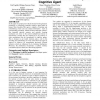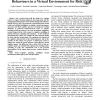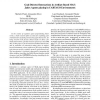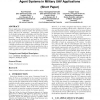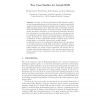128
click to vote
IJKESDP
2010
14 years 11 months ago
2010
Cognitive Agents must be able to decide their actions based on their recognized states. In general, learning mechanisms are equipped for such agents in order to realize intellgent ...
132
click to vote
IEEEIA
2009
14 years 11 months ago
2009
In this paper we propose the CTS (Concious Tutoring System) technology, a biologically plausible cognitive agent based on human brain functions.This agent is capable of learning a...
122
click to vote
IDC
2009
Springer
14 years 11 months ago
2009
Springer
Emergence is a key element in the research of multi-agent systems. Emergent properties provide higher level features to a system formed of simpler individuals. So far, emergence ha...
115
click to vote
JASSS
2002
15 years 1 months ago
2002
What is the degree of sophistication that we have to put into the agents in agents based computer simulation models? Should we provide them with a "mind"? The answer ran...
139
click to vote
IJVR
2008
15 years 2 months ago
2008
Our research deals with the design of a training system to support decision-making in the preparation and the management of maintenance interventions in high-risk industries namely...
112
click to vote
IAT
2008
IEEE
15 years 2 months ago
2008
IEEE
In the context of cognitive agent programming frameworks, a main research effort accounts for exploiting goalorientation for specifying and enacting agent interaction. Existing re...
126
click to vote
ATAL
2008
Springer
15 years 4 months ago
2008
Springer
Future applications of unmanned aerial vehicles (UAVs) especially in military missions require the operation of UAVs with a high level of autonomy. Autonomous UAVs could be develo...
126
click to vote
DALT
2006
Springer
15 years 5 months ago
2006
Springer
Abstract. This paper presents two approaches for generating and executing the plans of cognitive agents. They can be used to define the semantics of programming languages for cogni...
121
click to vote
IPPS
2007
IEEE
15 years 8 months ago
2007
IEEE
The vulnerable air interface, device level constraints, and insecure encryption techniques of wireless networks have naturally increased the chance of attacker obtaining users inf...
144
click to vote
AGS
2009
Springer
15 years 8 months ago
2009
Springer
Recently, we introduced Behavioural State Machines (BSM ), a novel programming framework for development of cognitive agents with Jazzyk, its associated programming language and in...

